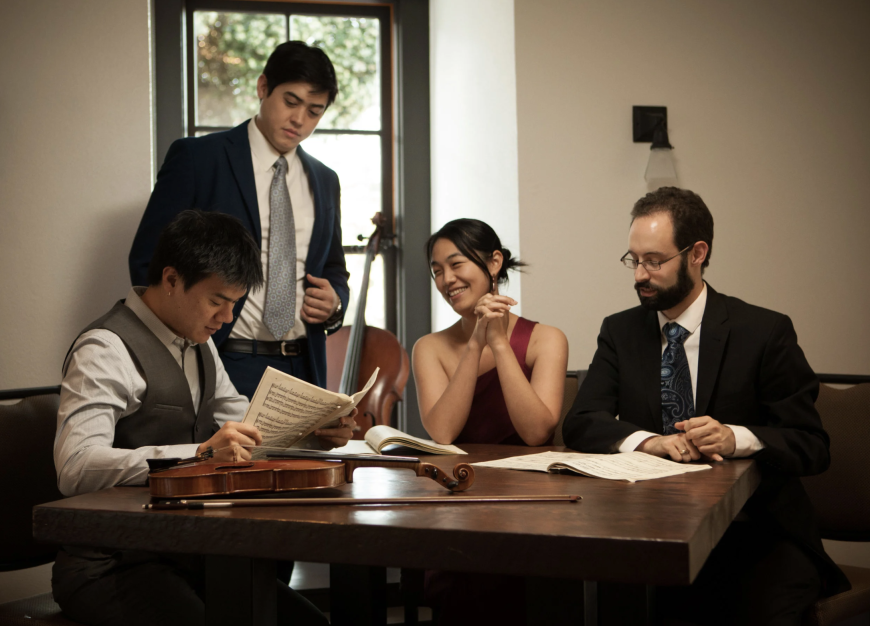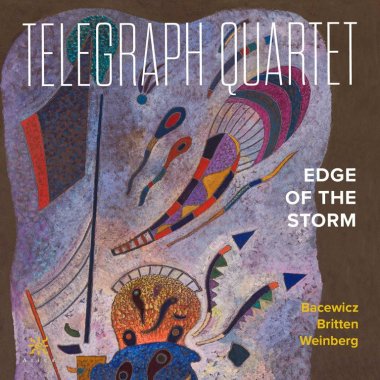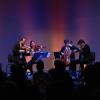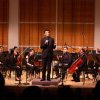
World War II has inspired (and continues to inspire) musical responses of many kinds, in all sorts of genres. For the splendidly produced second release in its 20th Century Vantage Points series, the Bay Area-originated, Michigan-based Telegraph Quartet has assembled three intensely emotional string quartets composed between 1941 and 1951 by composers from Poland, England, and the Soviet Union.
By turns anguished, martial, angry, jubilant, tragic, and triumphant, the powerful and passionate works in Edge of the Storm take us on a harrowing journey from uncertainty about what is to come (Benjamin Britten’s 1941 Quartet No. 1), to keening grief over the “horrors that befell mankind in our century” (Mieczysław Weinberg’s 1946 Quartet No. 6), to melancholic resignation and acceptance (Grażyna Bacewicz’s 1951 Quartet No .4).
Taken together, they convey, as words cannot, the psychological torment of those who survived the conflagration, in different mid-century musical styles both complex and accessible.

In the summer of 1941, Britten (1913–1976) wrote his First Quartet in Escondido, California, far from the front lines. A committed pacifist, he left England in 1939 and sojourned in the U.S. until 1942. Commissioned by legendary music patron Elizabeth Sprague Coolidge, this “American” quartet established Britten, then 27, as “a master of tonal architecture with scarcely a rival on the English scene,” one critic wrote.
The first movement’s shimmering violin passages and the third movement’s gently surging chords prefigure the sea music of his great opera Peter Grimes, completed in 1945. Britten favors the cello with many soaring lyrical passages, played here with exceptional tenderness and finesse by Jeremiah Shaw. After the anguished third movement, Telegraph Quartet’s members — Shaw, violinists Eric Chin and Joseph Maile, and violist Pei-Ling Lin — dig exuberantly into the playful fugue of the concluding Molto vivace.
Of the three composers, Weinberg (1919–1996) had the most immediate and terrifying experience of war: Born into a Jewish family in Warsaw, he fled Poland just ahead of the Nazis in 1939 and sought refuge in the USSR, where he remained for the rest of his life, often enduring antisemitic discrimination and persecution.
Trained in Soviet conservatories and mentored by Dmitri Shostakovich, Weinberg has long been identified as a Soviet or Russian composer, although in recent years the Polish cultural establishment has been vigorously reclaiming him.
Completed just one year after the war’s end, the sixth of his seventeen string quartets veers between plaintive sorrow and furious violence, often in the same movement. Echoes of klezmer music haunt the third movement, mellowed by an elegy in fugal form.
Teetering between triumph and mockery, the concluding Andante maestoso expresses the same sort of ironic ambiguity often encountered in Shostakovich’s music.
Ten years older than Weinberg, Bacewicz (1909–1969) remained in Poland through most of the War and worked for the Underground Union of Musicians, later becoming a major figure in Polish musical life under communism. The Fourth String Quartet, in a personal neoclassical style, has found particular favor with performers. Quiet and glowing lyricism prevails, with dreamy effects — especially a repeated “ticking” note — that convey twinges of regret, sadness, and lost time. Bacewicz includes affectionate references to traditional Polish folk dances, especially the athletic oberek in the dancing and optimistic rondo-form finale.
Here, as in all the vibrant performances on this creatively curated and extensively annotated disc, the Telegraph Quartet (supported by excellent sound engineering) plays with commitment, distinction, and finely disciplined passion.




